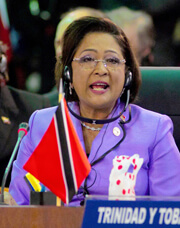After lunch on Friday, Feb. 15, Trinidad and Tobago, the Caribbean trade group’s largest economy, will elect a new president to replace former professor, Maxwell Richards, as the country’s head of state, but questions linger as to whether the high court judge nominated for the position is in fact eligible to hold the office.
Early last week, the administration of Prime Minister Kamla Persad-Bissessar nominated Justice Anthony Carmona to succeed Richards, who served two five-year terms as the twin island’s ceremonial president. But a debate is ranging as to whether he had met the mandatory 10-year residency rule.
In the lead-up to the announcement about Carmona’s nomination, another debate had raged as to who should get the nod, with the main opposition People’s National Movement (PNM) proffering its own nominee for the position. In the end, it backed down and threw its support behind Caroma, calling him an acceptable candidate. The nomination has been critically acclaimed from almost every quarter on the island as he is seen as being above the fray and is of mixed race in a country where that issue is very sensitive.
Since then, government has admitted that it has sought advice from eminent local and British attorneys as to whether Carmona, who lived outside of the island while serving in The Netherlands as a prosecutor at the International Criminal Tribunal for war crimes in the former Yugoslavia and Rwanda, has met the 10-year residency rule. He returned to T&T full time in 2004.
But but many in the legal profession argue that he has fallen short of the requirement and is therefore not eligible to be appointed by the electoral council comprising of both the senate and house sections of parliament. The eminent counsel that authorities had consulted had all suggested that he had maintained T&T residency and citizenship even by virtue of serving professionally overseas and is therefore eligible to replace Richards.
“The attorney general wishes to advise that the relevant law was in fact independently researched and considered by three eminent international jurists and the government is therefore satisfied that Mr. Justice Anthony Thomas Aquinas Carmona fulfils the constitutional requirements for him to be validly nominated as president of the Republic of Trinidad and Tobago,” Anand Ramlogan said.
Still unsure, the PNM said it has sent a confidential memo to Prime Minister Persad-Bissessar, asking for clarification as Carmona is the only nominee and no one wants the country to be embarrassed if it turns out that he is in fact not qualified to become head of state.
His appointment is a foregone conclusion if the legal uncertainties are cleared up before the special sitting of parliament on February 15, as most of the other paperwork for him already has been submitted to the outgoing president and the parliamentary speaker.
























